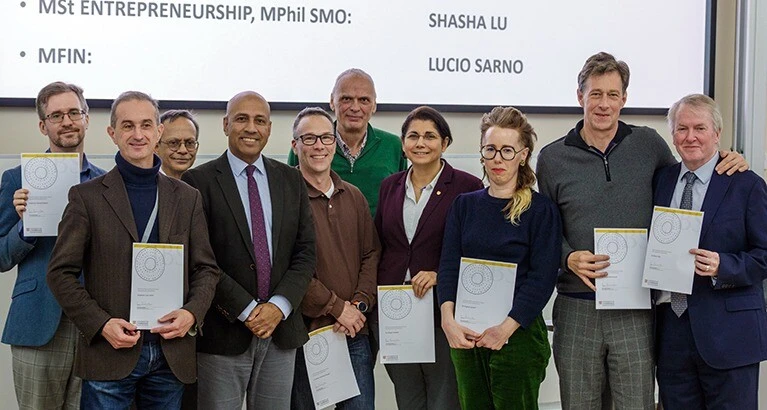Associate Professor in Corporate Governance
Co-Director of the Centre for International Human Resource Management (CIHRM)
BA (University of Kent), MPhil, PhD (University of London)
My research interests include human resource management, leadership, high performance working, organisational culture, change management, corporate governance, the dynamics of boards of directors, chief executive succession, and the influence of emotions such as guilt on work motivation. I developed the Global Human Resource Research Alliance, a research group involving 30 companies worldwide.
I’m a member of the Organisational Theory and Information Systems subject group at Cambridge Judge Business School, which is engaged with cross-disciplinary themes including leadership.

Professional experience
Philip developed the Global Human Resource Research Alliance, a research group involving 30 companies worldwide – American Express, BAE Systems, BT, EDF, GE, General Mills, IBM, IKEA, Infosys, Matsushita, Oracle, Procter and Gamble, Rolls-Royce, SANYO, Sealed Air, Shell, Siemens, TCL, TNT, and Unilever. The project represents the most comprehensive worldwide research study in the subject. The contribution to knowledge has been to identify both innovative and best HR practices within companies, and to show how human capital integrates with key dimensions of social and organisational capital.
Philip is also engaged in work on corporate governance, focusing primarily on the dynamics of boards of directors. He was involved in research for the Higgs Review on the Effectiveness of Non-Executive Directors, and he is also involved in examining the nature of succession within companies, carried out in collaboration with an international headhunting organisation. He consults to a number of organisations in both the private and public sector, and is a member of the Cambridge Corporate Governance Network (CCGN).
Publications
- Selected publications
- Journal articles
- Books, monographs, reports and case studies
- Book chapters
- Working papers
Selected publications
- Martin, G., Farndale, E., Paauwe, J. and Stiles, P.G. (2016) “Corporate governance and strategic human resource management: four archetypes and proposals for a new approach to corporate sustainability.” European Management Journal, 34(1): 22-35 (DOI: 10.1016/j.emj.2016.01.002)
- Stiles, P., Trevor, J., Farndale, E., Morris, S., Paauwe, J., Stahl, G. and Wright, P. (2015) “Changing routine: reframing performance management within a multinational.” Journal of Management Studies, 52(1): 63-88 (DOI: 10.1111/joms.12111)
- Velu, C. and Stiles, P. (2013) “Managing decision-making and cannibalization for parallel business models.” Long Range Planning, 46(6): 443–458 (DOI: 10.1016/j.lrp.2013.08.003)
- Stahl, G.K., Björkman, I., Farndale, E., Morris, S.S., Paauwe, J., Stiles, P., Trevor, J. and Wright, P. (2012) “Six principles of effective global talent management.” MIT Sloan Management Review, 53(2): 25-32
- Farndale, E., Paauwe, J., Morris, S.S., Stahl, G.K., Stiles, P., Trevor, J. and Wright, P.M. (2010) “Context-bound configurations of corporate HR functions in multinational corporations.” Human Resource Management, 49(1): 45-66 (DOI: 10.1002/hrm.20333)
- Stiles, P. and Taylor, B. (2001) Boards at work: how directors view their roles and responsibilities. Oxford: Oxford University Press.
Journal articles
- Stiles, P., Scott, E.T. and Debata, P. (2025) “Technology, capitalism, and the social contract.” Business Ethics, the Environment and Responsibility, 34(1): 32-42 (DOI: 10.1111/beer.12567)
- Martin, G., Farndale, E., Paauwe, J. and Stiles, P.G. (2016) “Corporate governance and strategic human resource management: four archetypes and proposals for a new approach to corporate sustainability.” European Management Journal, 34(1): 22-35 (DOI: 10.1016/j.emj.2016.01.002)
- Stiles, P., Trevor, J., Farndale, E., Morris, S., Paauwe, J., Stahl, G. and Wright, P. (2015) “Changing routine: reframing performance management within a multinational.” Journal of Management Studies, 52(1): 63-88 (DOI: 10.1111/joms.12111)
- Velu, C. and Stiles, P. (2013) “Managing decision-making and cannibalization for parallel business models.” Long Range Planning, 46(6): 443–458 (DOI: 10.1016/j.lrp.2013.08.003)
- Stahl, G.K., Björkman, I., Farndale, E., Morris, S.S., Paauwe, J., Stiles, P., Trevor, J. and Wright, P. (2012) “Six principles of effective global talent management.” MIT Sloan Management Review, 53(2): 25-32
- Farndale, E., Paauwe, J., Morris, S.S., Stahl, G.K., Stiles, P., Trevor, J. and Wright, P.M. (2010) “Context-bound configurations of corporate HR functions in multinational corporations.” Human Resource Management, 49(1): 45-66 (DOI: 10.1002/hrm.20333)
- Morris, S.S., Wright, P.M., Trevor, J., Stiles, P., Stahl, G.K., Snell, S., Paauwe, J. and Farndale, E. (2009) “Global challenges to replicating HR: the role of people, processes, and systems.” Human Resource Management, 48(6): 973-995 (DOI: 10.1002/hrm.20325)
- McNulty, T., Roberts, J. and Stiles, P. (2005) “Undertaking governance reform and research: further reflections on the Higgs review.” British Journal of Management, 16(Special Issue): S99-S107
- Roberts, J., McNulty, T. and Stiles, P. (2005) “Beyond agency conceptions of the work of the non-executive director: creating accountability in the boardroom.” British Journal of Management, 16(Special Issue): S5-S26
- Truss, C., Gratton, L., Hope-Hailey, V., Stiles, P. and Zaleska, J. (2002) “Paying the piper: choice and constraint in changing HR functional roles.” Human Resource Management Journal, 12(2): 39-63
- Stiles, P. (2001) “The impact of the board on strategy: an empirical examination.” Journal of Management Studies, 38(5): 627-650
- Stiles, P. (2001) “Ethics and governance.” Management Quarterly, 12: 8-13
- Gratton, L., Hope-Hailey, V., Stiles, P. and Truss, C. (1999) “Linking individual performance to business strategy: the people process model.” Human Resource Management, 38(1): 17-31
- Roberts, J. and Stiles, P. (1999) “The relationship between chairmen and chief executives: competitive or complementary roles?” Long Range Planning, 32(1): 36-48
- McGovern, P., Hope-Hailey, V. and Stiles, P. (1998) “The managerial career after downsizing: case studies from the ‘leading edge’.” Work, Employment and Society, 12(3): 457-477
- McGovern, P., Gratton, L., Hope-Hailey, V., Stiles, P. and Truss, C. (1997) “Human resource management on the line?” Human Resource Management Journal, 7(4): 12-29
- Hope-Hailey, V., Gratton, L., McGovern, P., Stiles, P. and Truss, C. (1997) “A chameleon function? HRM in the ’90s.” Human Resource Management Journal, 7(3): 5-18
- Stiles, P., Gratton, L., Truss, C., Hope-Hailey, V. and McGovern, P. (1997) “Performance management and the psychological contract.” Human Resource Management Journal, 7(1): 57-66
- Truss, C., Gratton, L., Hope-Hailey, V., McGovern, P. and Stiles, P. (1997) “Soft and hard models of human resource management: a reappraisal.” Journal of Management Studies, 34(1): 53-73
- Stiles, P. and Taylor, B. (1993) “Benchmarking corporate governance: an update.” Long Range Planning, 26(6): 138-139
- Stiles, P. and Taylor, B. (1993) “Benchmarking corporate governance: the impact of the Cadbury Code.” Long Range Planning, 26(5): 61-71
- Stiles, P. (1993) “The future for boards: self-regulation or legislation?” Long Range Planning, 26(2): 119-124
- Stiles, P., Jameson, A. and Lord, A. (1993) “Teaching business ethics: an open learning approach.” Management Education and Development, 24(3): 246-261
Books, monographs, reports and case studies
- Stiles, P. (2021) Board dynamics. Cambridge: Cambridge University Press.
- Stiles, P., Wright, P., Paauwe, J., Stahl, G., Trevor, J., Farndale, E., Morris, S. and Bjorkman, I. (2006) Best practice and key themes in global human resource management: project report. GHRRA.
- Stiles, P. and Kulvisaechana, S. (2003) Accounting for People taskforce report: human capital and organisational performance. London: Department of Trade and Industry, UK Government.
- McNulty, T., Roberts, J. and Stiles, P. (2002) Creating accountability within the board: the work of the effective non-executive director: a report for the Review of the Role and Effectiveness of the Non-Executive Director. London: Department of Trade and Industry.
- Stiles, P. and Taylor, B. (2001) Boards at work: how directors view their roles and responsiblities. Oxford: Oxford University Press.
- Gratton, L., Hope-Hailey, V., Stiles, P. and Truss, C. (1999) Strategic human resource management: corporate rhetoric and human reality. Oxford: Oxford University Press.
Book chapters
- Stiles, P. and Trevor, J. (2006) “The human resource department: roles, coordination and influence.” In Stahl, G.K. and Björkman, I. (eds.): Handbook of research in international human resource management. Cheltenham and Northampton, MA: Edward Elgar Publishing Ltd, pp.49-67
- Stiles, P. (2001) “The board’s role in strategy [translated into Japanese].” In Corporate Governance Forum of Japan (eds.): Corporate governance: reform of UK companies. Tokyo: Commercial Law Centre, pp.156-175
- Taylor, B., Stiles, P. and Tampoe, M. (2001) “The future for the board.” In Pierce, C. (ed.): The effective director: the essential guide to director and board development. London: Kogan Page, pp.173-181
- Taylor, B., Stiles, P. and Tampoe, M. (2001) “Governance and performance: the future for the board.” In Garrison, T. (ed.): Strategy dynamics. Henley: Henley Management College, pp.211-231
Working papers
- Toye Scott, E., Stiles, P. and Debata, P. (2022) “Managing new technology: the combination of model risk and enterprise risk management.” Cambridge Judge Business School Working Papers, No.01/2022. Cambridge: University of Cambridge.
- Stiles, P. (2008) “The negative side of motivation: the role of shame.” Cambridge Judge Business School Working Papers, No.07/2008. Cambridge: University of Cambridge.
- Stahl, G.K., Björkman, I., Farndale, E., Morris, S., Paauwe, J., Stiles, P., Trevor, J. and Wright, P. (2007) “Global talent management: how leading multinationals build and sustain their talent pipelines.” INSEAD Working Paper Series, No.2007/34/OB. Fontainebleu: INSEAD.
Awards and honours
- Cambridge Judge Business School Teaching Award, 2016
- IBM Faculty Fellowship
- Pilkington Teaching Prize for Excellence in Teaching, 2006
News and insights
Faculty news
2025 Cambridge Judge excellence in teaching awards
Eleven members of the Cambridge Judge Business School faculty are awarded teaching prizes for excellence across the Business School’s various programmes.
AI and technology
How AI is changing the way we work and how we’re governed
We should get used to the fact that our workplaces and interactions with government will change dramatically with the emergence of AI – but should we be concerned? Job losses, privacy infringements and rights erosion are growing themes in the media, but in this article we look beneath the hype and use the latest research from Cambridge Judge to explore the growing influence of AI and what the means for the future of human agency, potential and inclusion.
ESG and sustainability
A unique partnership for conservation
The Nature Conservancy tackles some of the world’s most challenging environmental problems. An Executive Education programme at Cambridge Judge Business School helped support the organisation’s leadership and professional development to achieve those goals.
Media coverage
Poets & Quants | 28 September 2022
Favorite professors of the MBA class of 2022
Mark de Rond, Professor of Organisational Ethnography and Philip Stiles, Associate Professor in Corporate Governance at Cambridge Judge Business School, are featured in a Poets & Quants article about the favourite professors of the MBA class of 2022.
Executive Courses | 3 May 2022
Executive education helps leaders navigate the virtual world of work
As the pandemic continues to evolve, the fate of the workplace remains uncertain. There are strong arguments on both sides in favour of remote and office-based models; many organisations appear to be planning for hybrid working.
Business Weekly | 1 December 2020
Three key things we learned about leadership from the US election
Dr Philip Stiles, University Senior Lecturer in Corporate Governance at Cambridge Judge Business School, highlights key things we learned about leadership from the US presidential election. “Beyond the headline results, US presidential elections always tell the world a lot about leadership – including style, personality, judgement, emotional fitness and communication – that often has application far beyond politics,” Philip says.
Business Weekly, 6 April 2020
Businesses must heed lessons from COVID-19 crisis, says Cambridge lecturer
TES, 11 November 2019
How to upgrade your teaching CV and application letter




